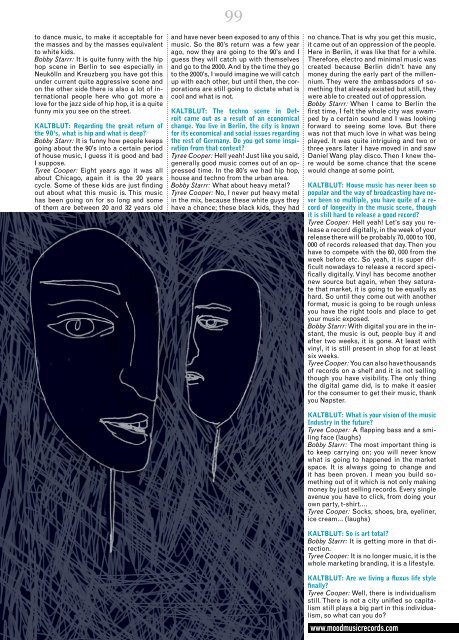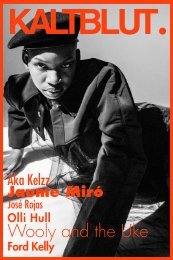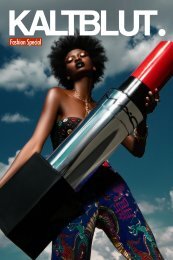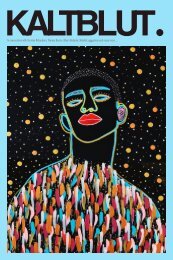COLLECTION 6
Create successful ePaper yourself
Turn your PDF publications into a flip-book with our unique Google optimized e-Paper software.
99<br />
to dance music, to make it acceptable for<br />
the masses and by the masses equivalent<br />
to white kids.<br />
Bobby Starrr: It is quite funny with the hip<br />
hop scene in Berlin to see especially in<br />
Neukölln and Kreuzberg you have got this<br />
under current quite aggressive scene and<br />
on the other side there is also a lot of international<br />
people here who got more a<br />
love for the jazz side of hip hop, it is a quite<br />
funny mix you see on the street.<br />
KALTBLUT: Regarding the great return of<br />
the 90’s, what is hip and what is deep?<br />
Bobby Starrr: It is funny how people keeps<br />
going about the 90’s into a certain period<br />
of house music, I guess it is good and bad<br />
I suppose.<br />
Tyree Cooper: Eight years ago it was all<br />
about Chicago, again it is the 20 years<br />
cycle. Some of these kids are just finding<br />
out about what this music is. This music<br />
has been going on for so long and some<br />
of them are between 20 and 32 years old<br />
and have never been exposed to any of this<br />
music. So the 80’s return was a few year<br />
ago, now they are going to the 90’s and I<br />
guess they will catch up with themselves<br />
and go to the 2000. And by the time they go<br />
to the 2000’s, I would imagine we will catch<br />
up with each other, but until then, the corporations<br />
are still going to dictate what is<br />
cool and what is not.<br />
KALTBLUT: The techno scene in Detroit<br />
came out as a result of an economical<br />
change. You live in Berlin, the city is known<br />
for its economical and social issues regarding<br />
the rest of Germany. Do you get some inspiration<br />
from that context?<br />
Tyree Cooper: Hell yeah! Just like you said,<br />
generally good music comes out of an oppressed<br />
time. In the 80’s we had hip hop,<br />
house and techno from the urban area.<br />
Bobby Starrr: What about heavy metal?<br />
Tyree Cooper: No, I never put heavy metal<br />
in the mix, because these white guys they<br />
have a chance; these black kids, they had<br />
no chance. That is why you get this music,<br />
it came out of an oppression of the people.<br />
Here in Berlin, it was like that for a while.<br />
Therefore, electro and minimal music was<br />
created because Berlin didn’t have any<br />
money during the early part of the millennium.<br />
They were the ambassadors of something<br />
that already existed but still, they<br />
were able to created out of oppression.<br />
Bobby Starrr: When I came to Berlin the<br />
first time, I felt the whole city was swamped<br />
by a certain sound and I was looking<br />
forward to seeing some love. But there<br />
was not that much love in what was being<br />
played. It was quite intriguing and two or<br />
three years later I have moved in and saw<br />
Daniel Wang play disco. Then I knew there<br />
would be some chance that the scene<br />
would change at some point.<br />
KALTBLUT: House music has never been so<br />
popular and the way of broadcasting have never<br />
been so multiple, you have quite of a record<br />
of longevity in the music scene, though<br />
it is still hard to release a good record?<br />
Tyree Cooper: Hell yeah! Let’s say you release<br />
a record digitally, in the week of your<br />
release there will be probably 70, 000 to 100,<br />
000 of records released that day. Then you<br />
have to compete with the 60, 000 from the<br />
week before etc. So yeah, it is super difficult<br />
nowadays to release a record specifically<br />
digitally. Vinyl has become another<br />
new source but again, when they saturate<br />
that market, it is going to be equally as<br />
hard. So until they come out with another<br />
format, music is going to be rough unless<br />
you have the right tools and place to get<br />
your music exposed.<br />
Bobby Starrr: With digital you are in the instant,<br />
the music is out, people buy it and<br />
after two weeks, it is gone. At least with<br />
vinyl, it is still present in shop for at least<br />
six weeks.<br />
Tyree Cooper: You can also have thousands<br />
of records on a shelf and it is not selling<br />
though you have visibility. The only thing<br />
the digital game did, is to make it easier<br />
for the consumer to get their music, thank<br />
you Napster.<br />
KALTBLUT: What is your vision of the music<br />
Industry in the future?<br />
Tyree Cooper: A flapping bass and a smiling<br />
face (laughs)<br />
Bobby Starrr: The most important thing is<br />
to keep carrying on; you will never know<br />
what is going to happened in the market<br />
space. It is always going to change and<br />
it has been proven. I mean you build something<br />
out of it which is not only making<br />
money by just selling records. Every single<br />
avenue you have to click, from doing your<br />
own party, t-shirt….<br />
Tyree Cooper: Socks, shoes, bra, eyeliner,<br />
ice cream… (laughs)<br />
KALTBLUT: So is art total?<br />
Bobby Starrr: It is getting more in that direction.<br />
Tyree Cooper: It is no longer music, it is the<br />
whole marketing branding, it is a lifestyle.<br />
KALTBLUT: Are we living a fluxus life style<br />
finally?<br />
Tyree Cooper: Well, there is individualism<br />
still. There is not a city unified so capitalism<br />
still plays a big part in this individualism,<br />
so what can you do?<br />
www.moodmusicrecords.com

















